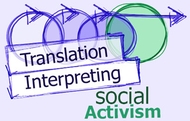Translation, interpreting and social activism

The University of Granada (Spain) will hold the 1st International Forum on Translation, Interpreting and Social Activism, from 28 to 30 April, 2007.
As linguistic, cultural and national borders become increasingly blurred by corporate-led globalisation and the ravages of perpetual war, non-mainstream institutions such as NGOs and social movements, as well as individual activists, are beginning to exploit the shift from national to transnational spheres of action to challenge mainstream ideologies that support patterns of injustice across the globe. The involvement and intervention of translators and interpreters on both sides of the power divide in this complex and volatile landscape is becoming a growing concern for the sociology and ethics of translation and interpreting.
In an attempt to respond to the growing interest within and beyond the academic field of translation studies in the role played by translators and interpreters in redressing the injustices of an increasingly polarised and conflictual society, this 1st International Forum aims to provide a platform for initiating debate on the urgent issue of translation/interpreting and activism among scholars, trainers, practitioners and civil society actors. The following themes are particularly relevant in this context:
- What aspects of the politics of translation have been considered so far in translation studies, and how adequate are the perspectives from which they have been approached? What paradigms and models frame translation as a political practice and translators as political actors?
- Are there productive models developed in social theory, particularly in the study of social movements and activist communities, that can offer theoretical and methodological insights in translation studies?
- What politically engaged initiatives are emerging in the translation and interpreting field across contexts (civil society, training institutions, private and public labour market)? To what extent do these initiatives respond to the need for an ethically oriented approach to translation and interpreting?
- How are issues of volunteering, status, professionalism and quality, among others, addressed across contexts?
- How can an ethical dimension be integrated in training, in the labour market and in the profession as a whole?
- What kind of institutions, organisations and groups depend on the political commitment of translators and interpreters in order to function politically, and how do they use translation and interpreting? Who undertakes translation and interpreting tasks in order to meet the needs of activist and advocacy groups?
- What interests, beliefs and/or social factors mobilise translators and interpreters, individually or collectively, to work for or against specific institutions, i.e. in the service of particular political agendas? What kind of dynamics shape the interaction between translators/interpreters and those they service in these contexts? To what extent do the strategies used differ from those in less politically engaged translation and interpreting tasks?
- How do professional associations, training institutions and communities of translators and interpreters view the involvement of translators and interpreters in political and social movements? What kind of discourse do scholars, trainers, practitioners and activists generate in relation to the growing activist profile of various groups of translators and interpreters? What is the nature of the dynamics of collective and personal discourse in this context?
Further information:
www.translationactivism.com



